
Coleman Randolph Hawkins, nicknamed "Hawk" and sometimes "Bean", was an American jazz tenor saxophonist. One of the first prominent jazz musicians on his instrument, as Joachim E. Berendt explained: "there were some tenor players before him, but the instrument was not an acknowledged jazz horn". Hawkins biographer John Chilton described the prevalent styles of tenor saxophone solos prior to Hawkins as "mooing" and "rubbery belches." Hawkins cited as influences Happy Caldwell, Stump Evans, and Prince Robinson, although he was the first to tailor his method of improvisation to the saxophone rather than imitate the techniques of the clarinet. Hawkins' virtuosic, arpeggiated approach to improvisation, with his characteristic rich, emotional, and vibrato-laden tonal style, was the main influence on a generation of tenor players that included Chu Berry, Charlie Barnet, Tex Beneke, Ben Webster, Vido Musso, Herschel Evans, Buddy Tate, and Don Byas, and through them the later tenormen, Arnett Cobb, Illinois Jacquet, Flip Phillips, Ike Quebec, Al Sears, Paul Gonsalves, and Lucky Thompson. While Hawkins became known with swing music during the big band era, he had a role in the development of bebop in the 1940s.

Benjamin Francis Webster was an American jazz tenor saxophonist.
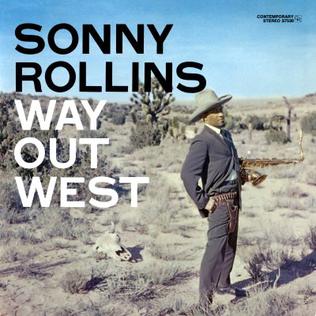
Way Out West is a 1957 album by Sonny Rollins with bassist Ray Brown and drummer Shelly Manne, neither of whom had previously played or recorded with Rollins. The music employs a technique called "strolling", used here by Rollins for the first time, in which he would solo over only bass and drums with no pianist or guitarist playing chords. The recent reissue of the CD has additional takes of three of the songs, including the title track. These additional takes are all about twice as long, containing much longer solos from all three members of the band.

Ella Fitzgerald Sings the Duke Ellington Song Book is a 1957 studio album by the American jazz singer Ella Fitzgerald, accompanied by Duke Ellington and his orchestra, focusing on Ellington's songs.

Further Definitions is a 1962 jazz album by Benny Carter and his orchestra, rereleased on CD in 1997 coupled with his follow-up album, 1966's Additions to Further Definitions. The earlier album features an all-star octet that includes Coleman Hawkins, with whom Carter had recorded in Paris in 1937, using the same configuration of instruments: four saxophones, piano, guitar, bass, and drums.

Ellington Indigos is a 1958 jazz album by Duke Ellington.

Duke Ellington & John Coltrane is a jazz album by Duke Ellington and John Coltrane released in January 1963 on Impulse! Records.
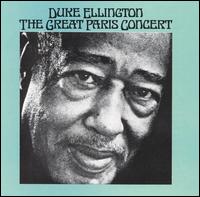
The Great Paris Concert is a 1973 live double album by jazz pianist Duke Ellington preserving pieces of a series of performances given in Paris during February 1963, a decade prior the release. Several of the tracks were previously edited and included in Duke Ellington's Greatest Hits. Those edited tracks were included on the 1989 CD re-release of The Great Paris Concert.

Although it is billed as a Duke Ellington and Johnny Hodges album, Side by Side is a 1959 album mostly under the leadership of Johnny Hodges, Duke Ellington's alto saxophonist for many years. Ellington only appears on three of this album's tracks. The album places Hodges at the fore, backing him with piano by Ellington or Billy Strayhorn and providing other accompaniment by jazz figures like Ben Webster, Roy Eldridge, Harry "Sweets" Edison and Jo Jones. The album, a follow-up to Back to Back: Duke Ellington and Johnny Hodges Play the Blues, has remained perpetually in print.
This is the discography of recordings by Duke Ellington, including those nominally led by his sidemen, and his later collaborations with musicians with whom Ellington had generally not previously recorded.
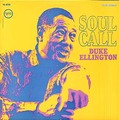
Soul Call is a 1967 live album by Duke Ellington and his orchestra, recorded live at the Juan-les-Pins/Antibes Jazz Festival on the Côte d'Azur. Ella Fitzgerald appeared with Ellington and his band at the same festival, and a more complete version of Ellington's appearance at the festival is documented on the 1998 album Ella and Duke at the Cote D'Azur.

The Popular Duke Ellington is a studio album by American pianist, composer and bandleader Duke Ellington featuring many of the tunes associated with his orchestra rerecorded in 1966 and released on the RCA label in 1967.

Recollections of the Big Band Era is an album by American pianist, composer and bandleader Duke Ellington recorded in 1962 and 1963 by Bruce Swedien at Universal Recording Corporation in Chicago for the Reprise label but not released until 1974 on the Atlantic label. The album features performances of compositions associated with big bands led by artists such as Count Basie, Fletcher Henderson, Louis Armstrong, Cab Calloway and others by the Duke Ellington's Orchestra. The 1989 CD reissue included 11 bonus tracks that originally appeared on Will Big Bands Ever Come Back? which was released on Reprise in 1965.

First Time! The Count Meets the Duke is an album by American pianists, composers and bandleaders Duke Ellington and Count Basie with their combined Orchestras recorded and released on the Columbia label in 1961.

Blues in Orbit is an album by American pianist, composer and bandleader Duke Ellington recorded for the Columbia label in 1959 and released in 1960.
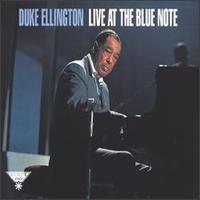
Live at the Blue Note is a live album by American pianist, composer and bandleader Duke Ellington recorded at The Blue Note nightclub in Chicago for the Roulette label in 1959.

Masterpieces by Ellington is the first LP album by American pianist, composer, and bandleader Duke Ellington, recorded for the Columbia label in 1950. It was one of the earliest 12-inch LPs to take advantage of the extended time available and consisted of four tracks, three of them "concert arrangements" of Ellington standards and one, "The Tattooed Bride," a recent tone poem.

Ellington Uptown is an album by American pianist, composer and bandleader Duke Ellington recorded for the Columbia label in 1951 & 1952. The album was re-released on CD in 2004 with additional tracks recorded in 1947 and originally released as the Liberian Suite EP.
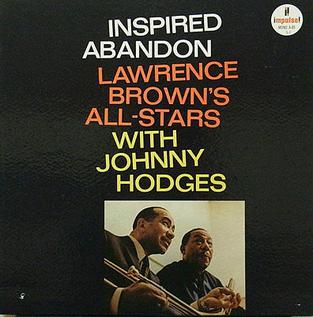
Inspired Abandon is an album by American jazz trombonist Lawrence Brown with Johnny Hodges featuring performances recorded in 1965 for the Impulse! label. The album was rereleased on CD as bonus tracks on the American CD reissue of Everybody Knows Johnny Hodges.

The Greatest Jazz Concert in the World is a 1967 live album featuring Duke Ellington and his orchestra, Ella Fitzgerald, Oscar Peterson, T-Bone Walker, Coleman Hawkins, Clark Terry and Zoot Sims. It was released in 1975.



















